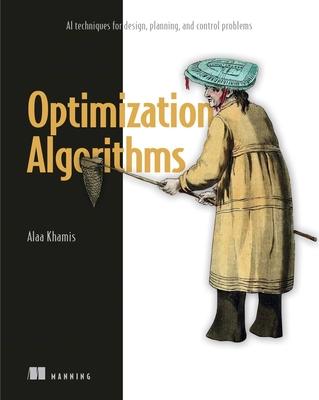- Machine learning methods for search and optimization problems
- The core concepts of search and optimization
- Deterministic and stochastic optimization techniques
- Graph search algorithms
- Nature-inspired search and optimization algorithms
- Efficient trade-offs between search space exploration and exploitation
- State-of-the-art Python libraries for search and optimization
Optimization problems are everywhere in daily life. What's the fastest route from one place to another? How do you calculate the optimal price for a product? How should you plant crops, allocate resources, and schedule surgeries? Optimization Algorithms introduces the AI algorithms that can solve these complex and poorly-structured problems. Inside you'll find a wide range of optimization methods, from deterministic and stochastic derivative-free optimization to nature-inspired search algorithms and machine learning methods. Don't worry--there's no complex mathematical notation. You'll learn through in-depth case studies that cut through academic complexity to demonstrate how each algorithm works in the real world. About the technology Search and optimization algorithms are powerful tools that can help practitioners find optimal or near-optimal solutions to a wide range of design, planning and control problems. When you open a route planning app, call for a rideshare, or schedule a hospital appointment, an AI algorithm works behind the scenes to make sure you get an optimized result. This guide reveals the classical and modern algorithms behind these services. About the book Optimization Algorithms: AI techniques for design, planning, and control problems explores the AI algorithms that determine the most efficient routes, optimal designs, and solve other logistical issues. Dive into the exciting world of classical problems like the Travelling Salesman Problem and the Knapsack Problem, as well as cutting-edge modern implementations like graph search methods, metaheuristics and machine learning. Discover how to use these algorithms in real-world situations, with in-depth case studies on assembly line balancing, fitness planning, rideshare dispatching, routing and more. Plus, get hands-on experience with practical exercises to optimize and scale the performance of each algorithm. About the reader For AI practitioners familiar with the Python language. About the author Dr. Alaa Khamis is an AI and smart mobility technical leader at General Motors and a sessional lecturer at the University of Toronto. He is also an adjunct professor at Ontario Tech University and Nile University, affiliate member of the Center of Pattern Analysis and Machine Intelligence (CPAMI) at the University of Waterloo, and a former professor of artificial intelligence and robotics.
